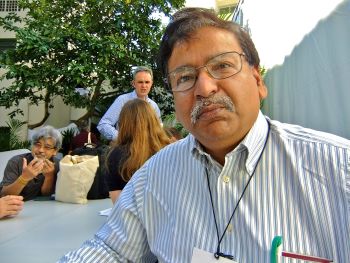By Stephen Leahy
RIO DE JANEIRO, Jun 16 (TerraViva) Goals drive action, and that’s why establishing a set of Sustainable Development Goals is so important to put the world on a sustainable pathway, experts said Saturday under the tropical fig and palm forest that covers much of the ground at the Pontifical Catholic University of Rio de Janeiro.
“Building a consensus on a set of goals will give the world community clarity about what needs to be done and a way to measure progress,” said Saleemul Huq, a senior fellow in the Climate Change Group at the International Institute of Environment and Development (IIED).

Saleemul Huq, Senior Fellow, Climate Change Group at the International Institute of Environment and Development (IIED). Credit: Stephen Leahy/IPS
Terms like “green economy” and “sustainability” have too many different meanings and too many different interpretations, Huq told TerraViva during a break at the two-day Fair Ideas conference organised by IIED and the Pontifical Catholic University.
The Millennium Development Goals (MDGs) have proven to be a useful tool even though some will not be achieved by the 2015 deadline, he said. The MDGs helped guide governments in setting their policies to try to meet the targets such as reducing poverty by half. The MDG target of having the number of people without access to safe drinking water was met early this year.
The MDGs have no environmental focus and they only applied to the developing world, Huq said.
“Sustainable Development Goals would be much broader covering pollution, environment impacts and consumption and apply to all countries rich and poor but in different ways.”
The governments of Colombia and Guatemala first proposed a framework for establishing Sustainable Development Goals (SDGs) be one of the main outcomes at the Rio+20 Summit on Sustainable Development.
“The SDGs are not about the environment, they are about securing a viable future for all people,” said Paula Caballero, director of economic, social and environmental affairs, Ministerio de Relaciones Exteriores of Colombia.
“We need the public and policy makers to understand this,” Caballero told the conference.
An SDG on ensuring food security isn’t just about food, it is also about ensuring water flows to grow those crops as well creating fair and equitable markets so that farmers can have reasonable livelihoods, she said. All of the current proposals for SDGs will lead to poverty reduction.
“SDGs would be tools for policy and decision making at all levels,” Caballero said.
The U.N. Secretary-General’s High-level Panel on Global Sustainability’s final report released in January also recommended the more than 190 countries participating at Rio+20 agree on SDGs.
At the same time, a prestigious group of independent global leaders working together for peace and human rights called The Elders called on the world community to endorse the SDGs in Rio.
“If decision-makers continue to focus mainly on economic growth to address the needs of humanity, rather than taking a range of factors into account in a more sustainable approach, they risk leaving future generations an even more polarised and dangerous world,” said Archbishop Desmond Tutu, chair of The Elders.
However, simply launching the idea of SDGs is not enough, said Caballero. Countries need to agree on a series of themes around which to create SDGs so that the work can begin the day after Rio+20 concludes.
“Equally important is an agreement on a sensible process to establish these goals,” she said.
The Rio+20 process alone is not the way to do this. Experts and all stakeholders need to be involved, but the process should allow the construction of SDGs, not the negotiation of these goals, she said.
Getting agreement to create SDGs will not be easy because they will include a target for reducing consumption of resources in the rich world, said Huq.
At the first Earth Summit in Rio in 1992, then U.S. President George H.W. Bush famously said the “U.S. lifestyle is not negotiable”. Reality and science says otherwise. But there is a growing debate within the U.S. on the need to reduce consumption, Huq said.
“Debates on consumption and the SDGs are needed in every country,” he said.
Rio+20 also needs to put a deadline on when the SDGs will be met, such as 2015 when the MDGs end.
“Without a time limit, nothing will happen,” Haq said.







 Add to Google
Add to Google







